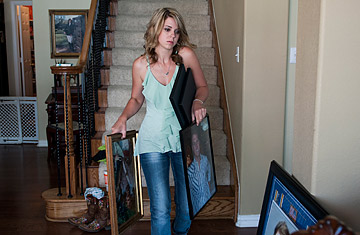
Grand Praire, TX. Rebecca Morrison with some of her husband Ian's belongings in her parents homes. Ian, an AH-64 Apache Helicopter pilot in the U.S. Army committed suicide on March 21, 2012. Ian chose 'Ike' for Rebecca.
(9 of 10)
"They've sent people to the roof, the basement, to your house. We're looking everywhere," a midwife told Leslie in a call minutes later. As they talked, Leslie suddenly heard people screaming and crying in the background. Then she heard them call a Code Blue. They had found him hanging from a noose in a call room. It had been less than 30 minutes since McCaddon had sent his final e-mail to his wife. Among the voices Leslie thought she recognized was that of McCaddon's commander, whose words came rushing back. "Does it seem like a family issue to her now?" Leslie remembers thinking. "Because it looks like it happened on her watch."
It took 15 minutes for the first responders to bring back a heartbeat. By then he had been without oxygen for too long. Leslie flew to Hawaii, and Captain McCaddon was taken off life support late Tuesday, March 20. He was pronounced dead early the next day.
That same day, Wednesday, March 21, Morrison saw a different Army doctor, who in a single 20-minute session diagnosed him with clinical depression. He got prescriptions for an antidepressant and a med to treat anxiety but hadn't taken either when he called his wife. Rebecca encouraged him to stop by the resiliency center on post to see if he might get some mental-health counseling there. Just before noon, Morrison texted Rebecca, saying he was "Hopeful :)" about it. She wanted to know what they told him. "Will have to come back," he responded. "Wait is about 2 hrs." He needed to get back to his office.
Rebecca was still concerned. At about 4 p.m., she urged her husband to call a military hotline that boasted, "Immediate help 24/7--contact a consultant now." He promised he would. "I said, 'Perfect. Call them, and I'll talk to you later,'" Rebecca says. "He was like, 'O.K., bye.'"
That was the last time she ever talked to him. Their final communication was one more text about 45 minutes later. "STILL on hold," he wrote to her. Rebecca responded moments later: "Can't say you're not trying."
Morrison called Rebecca at 7:04 p.m., according to her cell phone, but she was leading a group-therapy session and missed it. He didn't leave a message.
Two and a half hours later, she returned home from her grad-school counseling class. She threw her books down when she entered the living room and called his name. No answer. She saw his boots by the door; the mail was there, so she knew he had to be home. "I walked into our bedroom, and he was lying on the floor with his head on a pillow, on my side of the bed." He was still in his uniform.
Rebecca stammers, talking softly and slowly through her sobs. "He had shot himself in the neck," she says. "There was no note or anything. He was fully dressed, and I ran over to him and checked his pulse ... and he had no pulse. I just ran out of the house screaming, 'Call 911!' and ran to the neighbors."
The Next Mission
At a suicide-prevention conference in June, Panetta laid down a charge: "We've got to do everything we can to make sure that the system itself is working to help soldiers. Not to hide this issue, not to make the wrong judgments about this issue, but to face facts and deal with the problems up front and make sure that we provide the right diagnosis and that we follow up on that kind of diagnosis."
